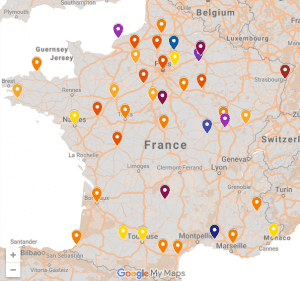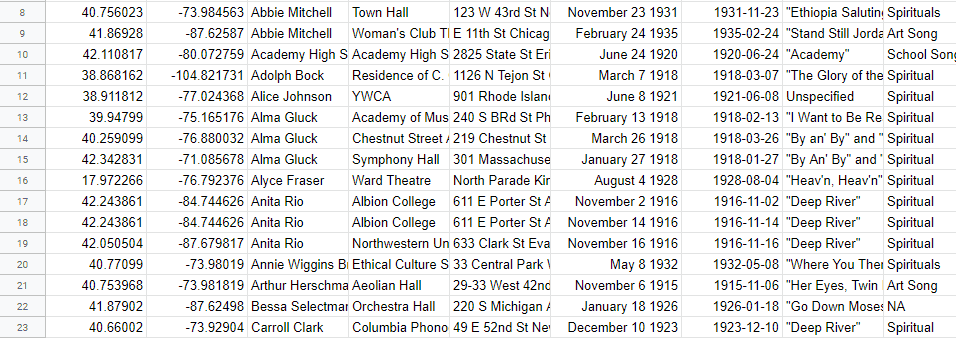If there was only one thing I could take away from this interim, it would be a whole lot of gratitude for being only a first year student. This project on H.T. Burleigh, besides all the valuable information I’ve learned on early American music and composers, besides the practical data collecting and formatting skills I’ve picked up, has opened my eyes to an entirely new side of academia that I have never been able to experience before. Research. There’s something so adventurous and daunting and exciting about it that propels me into learning every bit of information I can and gives me feelings of immense satisfaction at something as small as finding a street address. I haven’t felt this way about an academic subject since well before high school, and I’m extremely grateful that I still have another three and a half years at this college. I understand (sadly) that a class such as Musical Geographies isn’t exactly commonplace at an undergraduate institution and I most likely won’t have the opportunity to conduct research in every future semester I have here, but I absolutely intend to continue work with the Musical Geography project with Dr. Epstein.
On the subject of this project, I have a myriad of personal reflections, notes to self, and of course plenty of humble advice for future geographers of the digital humanities. I came into this research course with a background that lacked any experience whatsoever in, well… research. Was I intimidated? Yeah you could say so. Did I have any idea where to start? Nope. But was I surrounded by passionate, intelligent peers and professors who had every intention of helping me succeed? Absolutely. Fortunately enough for me, we began the course with an introductory project of further researching and improving upon a chosen map with a partner. 
It certainly wasn’t my proudest work, as you can see it’s fairly sparse and lacks a lot of depth, but it helped give me an essential grasp of what kind of research and data collecting strategies I would have to employ once we reached the big bad Burleigh project (I wrote a blog post about it here). Once we really hit the books, or more accurately, the online archival databases, it didn’t take long for me to understand the benefits of such a seemingly trivial and elementary task. This map, combined with the first few weeks of readings for the class gave me a much more critical view of the importance of what we were doing with H.T. Burleigh and why mapping our research would prove to be an effective and engaging way for further scholars and otherwise intrigued viewers of our final product to access the information we provided.
Throughout this month of research and data cleaning and map making, one would expect to learn new and more efficient ways to go about all these tasks. Now, I most certainly did, and looking back on the first few days of research or my first attempts at data cleaning, there are so many things I wish I could’ve told myself. However, I also can guarantee that there are far more efficient and intuitive ways to complete these tasks in less time and even greater depth than I discovered over these past weeks, and I don’t feel as though I’m in the position to give final advice or “the best” ways to do anything research related. That all being said, I will definitely share a few general tips and strategies to at least take into mind as you delve into any project on the digital humanities that you may be pursuing:
- Find something about your research that motivates you!
- I understand that you most likely have some sort of topic or hypothesis you may already be pursuing that perhaps wasn’t exactly personal choice. Personally, I wasn’t foaming at the mouth at the sound of making a map on H.T. Burleigh. What did really give me enthusiasm for the project however was actually one of the side assignments in the course. It was an annotation on a DH (digital humanities) model. The model I annotated was a storymap called The Geography of Hip Hop, and this beautiful and interactive map (which I’m still in love with) gave me so many ideas and hopes for our Burleigh project that I went back into research the next day with newfound zeal that I carried well across the finish line.
- Think about the end game before you dive in!
- One of my other blog posts actually covered this topic, but I’ll repeat it simply because of how important it is. This philosophy applies to every part of a digital humanities project. Absolutely you should be thinking about what you intend your map to show and answer in it’s finished form, but it’s also so important to apply this to every point of data you collect. What will this data represent, and how will it do so? Is it useful information that might help discover a larger pattern or is it something I’m just throwing in for sheer volume? Not that quantitative data is any less useful than qualitative data, but these questions should be taken into consideration.
- Communication with project peers is everything!
- Again this is a very broad piece of advice, but it covers so many small, important details in data collection and representation. If everyone always knows what each other person in working on and knows who to ask for questions or further data, the project will run so much smoother. It’s nearly impossible to think of every possible thing to communicate about, but being on the same page for things like date format, citation styles, lat/long decimal places, and even font size or color can save literal hours of data cleaning at the end. As therapeutic as clicking through hundreds upon hundreds of spreadsheet rows can feel, it does get a little monotonous at times.
This will be me signing off until I undertake my next project with Musical Geography, and I definitely have some feelings of remorse for not being able to do more research like this until at least the next academic school year. I’m beyond grateful for the connections I’ve made with other students and staff members, as well all the information I’ve picked up on H.T. Burleigh and the American music scene of the early 20th century, and I’m thrilled for any future projects in the digital humanities.

You must be logged in to post a comment.